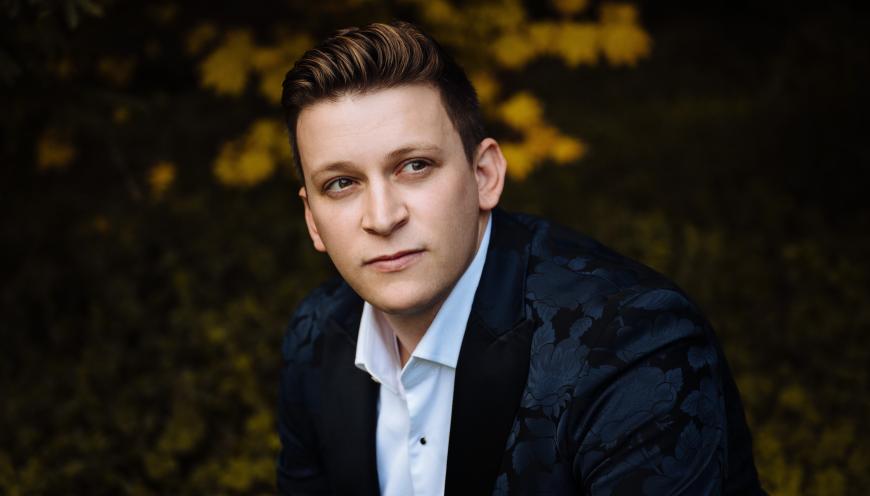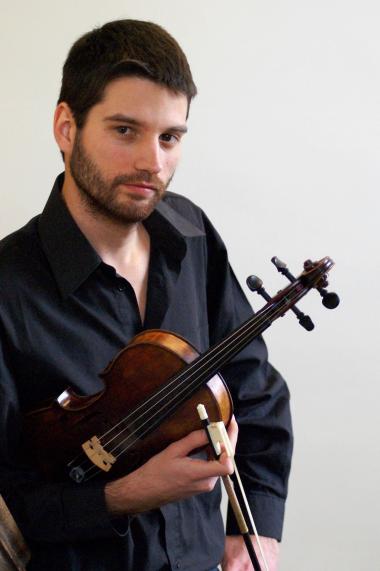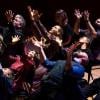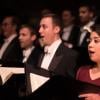
American Bach opened its 2023–2024 season last weekend with concerts featuring the young countertenor Aryeh Nussbaum Cohen. A former Adler Fellow, Nussbaum Cohen is well known locally for appearances with the San Francisco Symphony and San Francisco Opera, as well as early-music ensembles such as Cantata Collective and Philharmonia Baroque Orchestra. He has rapidly gained a name for himself in the competitive world of countertenors; he is fresh from a highly praised Italian debut at Rome’s Teatro dell’Opera, performing the role of Sesto in Handel’s Giulio Cesare in Egitto, as well as a recital cleverly billed as “The Three Countertenors.”
Nussbaum Cohen brings a big voice and a powerful stage presence to any ensemble, and these were well in evidence in the two J.S. Bach cantatas on Saturday’s concert in Berkeley. Widerstehe doch der Sünde (Just resist sin) was written by the young Bach for a 1714 performance at the court of Weimar, probably during the penitential season of Lent, as the text is insistent on admonishing listeners to turn away from the wiles of sin. Befitting the harsh message, the music is rich with dark harmonies, pulsating rhythms, and unusually gnarly motifs. Nussbaum Cohen delivered the stern message with clarion impact on the long notes and restless energy in the fast-moving passages.
The other cantata was the famous Ich habe genug (I have enough), written about a decade later, when Bach had taken up his position at the St. Nicholas Church in Leipzig. Although the piece focuses on imminent and longed-for death, it is not itself gloomy, as American Bach Artistic Director Jeffrey Thomas pointed out, but profoundly celebrates a welcome end to a fulfilled life. Particularly beautiful — and often sung as a recital piece — is the central aria, “Schlummert ein” (Fall asleep). In this serene movement, as well as in the other two arias, Nussbaum Cohen’s powerful upper register and youthful vigor came across as overly strong, almost strident at times, and insufficiently connected with the softer passages of his lower register.
The rest of the program was instrumental and secular in nature. With his usual ear for varied programming, Thomas balanced Bach with two works by a composer from two generations earlier, the Viennese violin virtuoso Johann Heinrich Schmelzer. The young Bulgarian-born violinist Tomà Iliev opened the concert with the Fourth Sonata from Schmelzer’s groundbreaking 1664 collection for solo violin. In this work, the violin embellishes a simple repeated bass line with pretty much every trick in the book (at least all those available in the later 17th century).

Iliev’s resonant, deep-in-the-string sound carried brilliantly in the supportive chancel of St. Mark’s Episcopal Church, with the soloist clearly relishing the surprise transitions in this inventive piece. A second Schmelzer sonata featured three violins, in which Iliev was joined by Cynthia Black and YuEun Gemma Kim. It was an exciting free-for-all romp around a series of angular motifs. One could imagine Schmelzer listening happily as three of his students vied with each other in friendly competition.
Another memorable pre-Bach piece on the program was a violin sonata by one of Schmelzer’s students, Heinrich Ignaz Franz Biber. Kim played the work with a clear, focused tone and a firm grasp on the many technical challenges that Biber throws at the soloist — including on-the-fly retuning in the middle of the piece, between an opening passacaglia and a virtuosic gavotte. The sonata concludes with a brilliant if somewhat icy gigue and a gorgeously meditative quasi-chorale.
The musicians gave us some secular Bach as well, the C-Minor Concerto for Oboe and Violin. This is a 19th-century reconstruction of a lost original (based on the surviving arrangement for two harpsichords), here played by Iliev and oboist Stephen Hammer. In this, as in the other large-ensemble works, the excellent continuo section (Corey Jamason on organ and harpsichord, Gretchen Claassen on cello, Steven Lehning on violone, and Nate Helgeson on bassoon) was joined in various combinations by the oboe and violin soloists and by violists Yvonne Smith and Clio Tilton.
At the end of the concert, enthusiastic applause for Ich habe genug brought Nussbaum Cohen back for a splendid encore from his recent Italian gig — Handel’s beautiful aria “Cara speme” (Precious hope), accompanied simply by harpsichord and cello.
Thomas conducted with a sure and unobtrusive touch and — as always — guided the audience through the evening with comments that were brief and to the point. That American Bach has now entered its 35th season with such vitality is due in no small part to the founding director’s unflagging commitment, strong leadership, and gracious demeanor.




